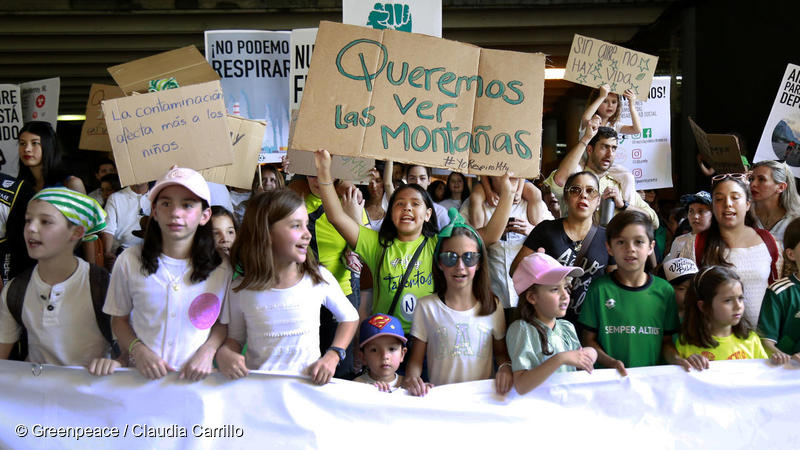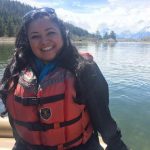
Organizacion Boricua, Amigos del Mar, and other allies in Puerto Rico welcome the Our Power Puerto Rico brigade as they arrive in San Juan on the Arctic Sunrise. Climate justice organizations are connecting and working with local communities and organizations to support the process of a just recovery for the island, to help its people thrive and be better prepared in the case of future climate disasters.
I was born and raised in El Salvador and moved to the States at the age of ten. Today, I’m an Oceans Plastics Campaigner for Greenpeace USA and, over the last 11 years in this organization, I’ve filled many roles: fundraiser, organizer, and now a campaigner. In these roles, I realized right away how important it is for us all to be part of activism — especially how essential it is for my community, the Latinx community, to be part of the environmental and social justice movement.
We all know Greenpeace hasn’t always been a diverse movement. But today, Greenpeace is network of organizations worldwide, including across Latin America. In the United States, Greenpeace USA often works with Latinx community organizations in California, the Gulf, and Florida because we know that it is our communities who are affected first and worst when it comes to the climate crisis.
It breaks my heart to see BIPOC and marginalized communities suffer the consequences of environmental racism. Low-income communities — especially communities of color — face more health impacts near plastic production sites, have greater exposure to toxins and waste because they often have no other option than to buy cheap plastic products, and bear the brunt of the impacts of improper plastic disposal and incineration.
For example, here’s some astonishing data from Moms Clean Air Force and T.E.J.A.S (Texas Environmental Justice Advocacy Services):
- 48% of Latinos in the US live in counties that frequently ballot ground-level ozone standards.
- 68% of Latinos live in areas that fail to meet federal air quality standards compared to 58% of whites.
- More than 1.81 million Latinos live within one-half mile of existing oil and gas facilities.
- Latinos are three times more likely to be negatively affected by air pollution because of where they live and work.
- At least one in three schoolchildren in America attends a school within the vulnerability zone of a hazardous facility. Black, Latino, and low-income communities are disproportionately at risk.
- In Richmond, California — a predominantly Black and Latinx city in the San Francisco Bay Area — emergency room visits increased sevenfold after a major fire at Chevron’s Richmond Refinery in 2012.
Knowing this, I cannot stand back.
I have to take action.
We have to take action.
Sabemos que si se puede, our resilience, our commitment to protect the ones we love, has shown us that we can do this just like other Latines have before. We also have to uplift the intersections of the environmental movement. It is not just climate. It’s climate and labor, climate and migration, climate and racial justice.
Our work is intrinsically intertwined with the work of groups like the United Farm Workers Union (UFW), Immigrant rights movements, and the Movement for Black Lives.

The students of Yo Respiro Monterrey marched to demand all those involved in this problem, take measures and work to solve the problem of poor air quality in the city, as well as take more energetic measures to curb climate change.
Los estudiantes de Yo Respiro Monterrey marcharon para exigir a todos los involucrados en este problema, tomar medidas y trabajar para resolver el problema de la mala calidad del aire en la ciudad, así como tomar medidas más enérgicas para frenar el cambio climático
According to a recent Yale study, over 70% of Latinx people in the United States are concerned about the environment. Latinx people play an integral part in the environmental movement, and it’s about time our experiences are brought to the forefront.
We’ve done a lot, but we have so much more to do. So how about you, your friends, and familia get involved and join us in this movement para nuestra gente y nuestro futuro. Start here, sign up to volunteer, help us pressure leaders to do the right thing, the just thing. We must remove fossil fuel subsidies from the Infrastructure Deal, say NO to single-use plastic, and vote out legislators sponsoring anti-voter or anti-protest bills during their most recent election campaigns.
Juntos podemos y adelante seguiremos.
—
This essay is part of our Perspectives: Our Next Fifty Years series, in which we reflect briefly on our first fifty years, but more importantly, we lay out the future we are building together—collaborative, ambitious, and intersectional. The work ahead won’t be easy, but we’ve never shied away from hard work. We continue to push for policies that recognize the contributions and leadership of marginalized groups, and we amplify their voices, looking to their wisdom to show us the way. We hold corporations accountable, demanding real action that puts people ahead of profit. We work each day with our partners to co-create green, safe planet for all beings. We recognize that equality is not necessarily justice. We demand more from our leaders, from our colleagues, and from ourselves. A green and peaceful world isn’t just a slogan—it is our mission, and it takes each one of us to get there.


